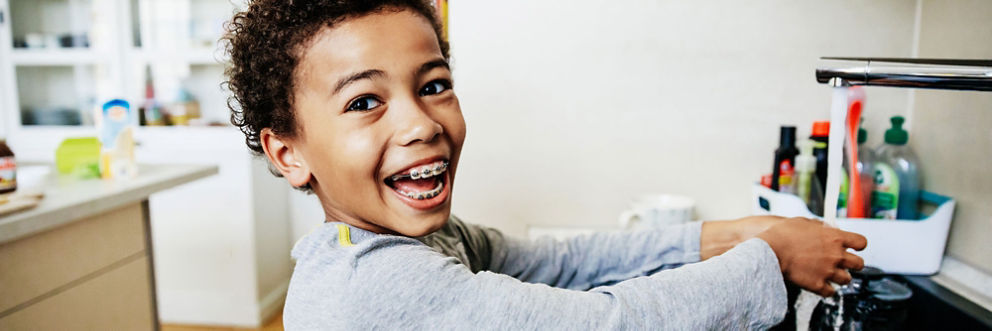Children's mental & behavioral health
Support and treatment for children’s mental health
Childhood is a time of wonder and excitement, but sometimes kids face obstacles that require help. If you’ve noticed signs of a change in the way your child or teen sees and responds to the world, we can help.
Mental health disorders are very common among children. In fact, 20% of kids in the U.S. are diagnosed each year. But parents can rest assured that these conditions are treatable through a variety of methods, and support is available for both children and families every step of the way.
At HealthPartners and Park Nicollet, we take an integrated approach to treating mental health conditions. Using the skills and experience of both our primary care doctors and mental and behavioral health specialists, we’re able to provide treatment for a broad range of conditions, from the common to the more complex.
Our team of mental and behavioral health experts works with families to develop a personalized plan for support and treatment using the latest clinical research.
What we treat
- Adjustment disorders
- Anger issues
Anxiety - Attention deficit hyperactivity disorder (ADHD)
- Autism spectrum disorder
- Bipolar disorder
Depression - Disruptive behavior
Eating disorders - Fetal alcohol syndrome
- Grief and loss
- Intellectual disabilities
- Obsessive compulsive disorder (OCD)
- Panic disorder
- Phobias
- Post-traumatic stress disorder (PTSD)
- Schizophrenia
- Seasonal mood problems
Seasonal mood disorder Self-harm - Situational stress
- Social anxiety
With locations in Minnesota and western Wisconsin, we offer compassionate help for mental health close to home.
Signs of mental and behavioral conditions in children
Children naturally experience changes in mood and behavior as they grow and mature. But sometimes the changes parents notice are more severe or don’t seem to be improving over time. Signs of mental and behavioral conditions may differ from child to child. Children may experience changes in weight or sleep habits. They may have difficulty concentrating and staying still. Anytime your child has new or unusual symptoms that you are concerned about or are worsening, it’s a good idea to schedule an appointment.
Diagnosing mental health conditions
Monitoring a child’s mental and developmental health is a partnership between parents, teachers, coaches and the child’s primary care doctor. Each plays a unique role in the child’s life and may be the first to notice something of concern. It’s important that everyone in a child’s life works together and openly communicates about any potential concerns.
Our primary care doctors are trained to observe each child’s physical and mental health and listen to any concerns you share during your visit.
If our doctors think the help of a specialist is needed, we can refer you to one of our child mental and developmental health experts. When you meet with our specialists, we will determine the type and extent of evaluation needed to obtain an accurate diagnosis. An evaluation may include one or more of the following:
- an interview
- rating scales
- psychological testing
If next steps are needed, we will begin working with you and your child’s primary care doctor on the best treatment plan for your family.
Personalized treatment plans
Whether your child is experiencing grief or social anxiety in school, your family has our support. We consider medical, developmental and behavioral factors as we get to know each child we meet.
It’s common for personalized treatment plans to include a combination of several treatment techniques, such as:
Talk therapy
In talk therapy, also known as psychotherapy or therapy, a child meets with a mental health specialist for a number of counseling sessions. Depending on their age, the child may meet with a therapist alone or with their parents present. An important part of talk therapy is the private relationship between the patient and therapist. Often a child or teen is more comfortable sharing their feelings with a therapist rather than with a parent, teacher or friend because they feel free from judgment and consequences to school, hobbies or personal relationships.
Therapy sessions follow different psychological techniques, based on the patient’s needs. Therapists are specially trained to ask questions that help them understand a child’s mental health and determine the best way to help. Through therapy, children can find a comfortable outlet for expressing their feelings and learn valuable ways to process their emotions, adopt new skills and change behaviors.
Speech and language therapy
Speech and language pathologists work with our team of psychologists and developmental-behavioral pediatricians. They treat and diagnose speech and language delays and disorders. They also identify potential barriers to verbal and social communication and provide treatment to work to remove those barriers.
Family therapy
As another therapy option, family counseling is available to support children and families through emotional challenges and relationship conflicts. In family counseling, a therapist works with the child, parents and siblings together. Families often find support to help them through a difficult time or diagnosis, as well as learning ways to contribute to the child’s mental health. Therapists can also help families work through difficult relationship conflicts and learn how to improve home dynamics.
Medications
Medication can be another effective treatment option, and it’s often recommended in combination with talk therapy. Some medicines are meant for short-term use while others are prescribed for a longer period. Doctors may prescribe antidepressants, antianxiety medications, mood stabilizers, stimulants or others.
If you haven’t talked to a doctor about your child’s symptoms, we recommend starting with a visit to one of our primary care doctors or pediatricians. We’ll listen to your concerns and can connect you to the right specialist if needed.
